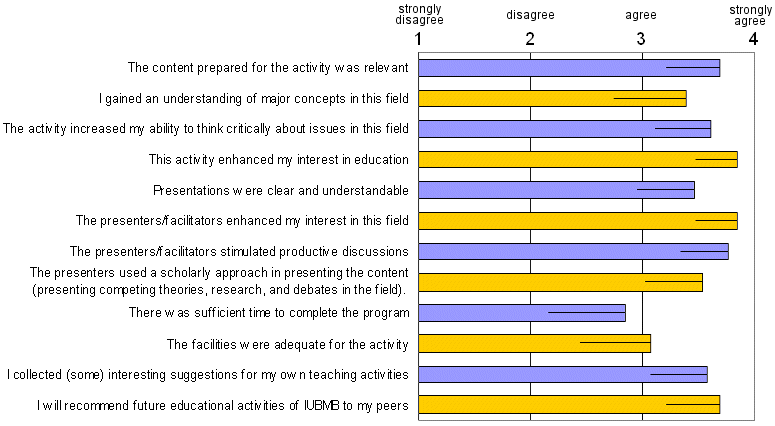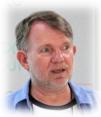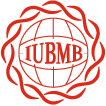Results:
Participants filled in a rating form evaluating their experience in the workshop. These are the results:

Bars: average; lines: standard deviation.
A satellite meeting of the XXXIII Congress of the Spanish Society of Biochemistry and Molecular Biology
An IUBMB-sponsored Educational Activity
Córdoba, Spain, 14 to 15 September 2010
Information updated 25 Sept. 2010: rating by attendants
| Tuesday, Sept. 14 | Wednesday, Sept. 15 | |||
|---|---|---|---|---|
| morning | 8:15 | Bus departs from Hotel Córdoba Center towards campus | 8:45 | Train departs from Córdoba Station |
| 8:30 – 9:00 | Reception and documentation | |||
| 9:00 – 13:30 | Opening Session 1 Session 2-1 Coffee break ≈11:15-11:45 |
9:00 – 11:30 | Session 2-3 Session 4 Coffee ≈11:30-12:00 |
|
| Workshop Lunch | 12:00 | Workshop ends | ||
| afternoon | 15:15– 19:1500 | Session 2-2 Session 3 Coffee break ≈17:15-17:45 |
12:15, 13:15, 14:15, etc. | Train departs from campus |
| 19:45 | Train departs from campus | |||
| Workshop Dinner | ||||
Reception desk and delivery of documentation will be in the hall of the "Aulario Averroes" building (see details under the "Venue & travel" section). The workshop sessions will be held in computer room "Aula A2", in the same building. Lunch will be at the cafeteria (same building) and dinner at "Taberna La Cazuela", downtown (see map).
Despite the programming, development of the workshop should be dynamic and open to discussion and focus on topics that prove interesting to the attendants.
Participants filled in a rating form evaluating their experience in the workshop. These are the results:

There is an increasing concern among University instructors in relation to the shifts in teaching practice brought by the adaptation of degrees to the European Space for Higher Education. A similar interest exists in other countries outside Europe where the value of active learning is also acknowledged and such changes sought. Among the major worries is the issue of how to assess the student learning outcomes, particularly so for out-of-class work and student-driven activities.
This workshop proposes to offer expert guidance, as well as to foster discussion among the attendants, about how to construct assessment materials that evaluate the student assimilation of the subject. This exchange will crystallise in the collaborative elaboration, discussion and improvement of a question set during the meeting, in the topics of protein structure and protein function.
Leading lines of the workshop will be:
There will be a few lectures by experts in the fields of assessment, instructional design and the use of molecular visualisation in teaching.
Following that, the attendants will assemble into working groups in order to elaborate question sets. Depending on the personal interests, parallel groups will focus on the use of molecular visualisation (specifically Jmol-based software tools) to support the questions, or alternatively on the design of questions of a more generic or classic format.
The groups will work under the guidance of both the speakers and other tutors with experience in either assessment techniques or implementation of molecular visualisation. Their first task will be to establish a blueprint, or definition of what needs to be assessed. For example, topics in peptide bonds, secondary and tertiary structure, protein folding (and misfolding), ligand binding, protein-protein interactions, pathological alterations, etc. Then they will construct the questions to cover that blueprint. Following, the draft question sets will be presented in a joint session with all groups, and discussed in order to do a final revision of the material later on.
The participants (mostly University instructors, both current and prospective) will learn and practice approaches for a profitable and reliable assessment of the students. In addition, they will enrich their knowledge about molecular visualisation tools and particularly how to use them pedagogically both to support teaching, to improve learning efficiency and to complement or facilitate meaningful assessment.
The material elaborated during the workshop will be a useful “take-home” resource for the attendants’ own use in their teaching, and may also be the start of a repository for shared use by the community of Biochemistry instructors.
 |
Manuel J. Costa Lecturer and Coordinator of the Medical Education Unit, Univ. do Minho, Portugal. Member of the Education Committee of the International Union of Biochemistry and Molecular Biology. Expert in education quality monitorisation and pedagogical training of instructors. |
 |
Eric Martz Professor Emeritus of Cell Biology and Immunology, Univ. of Massachusetts, USA. World leader in macromolecular visualization. Lead developer of Chime applications, Protein Explorer, First Glance, and First Glance in Jmol. Developer of Proteopedia. Expert Jmol author. |
 |
Jaime Prilusky Head of the Bioinformatics Unit, Weizmann Institute of Science, Israel. Lead developer of OCA, Proteopedia, 3DBase and 3D Browser. Expert Jmol author. |
 |
Frieda Reichsman Molecules in Motion, USA, and The Concord Consortium, USA. Lead Teacher/Teacher Professional Developer. Multimedia designer and illustrator for several scientific journals and textbooks. Expert Jmol author. |
 |
Angel Herráez Lecturer, Universidad de Alcalá, Spain. Current coordinator of the Education Group of the Spanish Society of Biochemistry and Molecular Biology. Experienced author of multimedia web-based educational materials. Expert Jmol author and contributor to development. |
The Workshop will be held at the same venue as the XXXIII Congress of the Spanish Society of Biochemistry and Molecular Biology: University of Córdoba, south of Spain.
Custom map with all markers for the Workshop.
The University campus (Campus de Rabanales, Universidad de Córdoba) is located 3 km out of town and can be accessed either by car or by train.
[campus location in the map]
Address:
N-IV motorway, km 396. Postal code: 14014
Coordinates: 37° 54' 48.64" N, 4° 43' 17.68" W or 37.914471,-4.71925
The Workshop will take place in computer room "Aula A2" in the "Aulario Averroes" building. [Detailed campus map; building map]
| From town | From campus | |||
|---|---|---|---|---|
| am | pm | am | pm | |
| 7:20 7:40 8:15 8:45 9:10 10:20 10:45 11:50 |
13:00 14:00 14:30 14:55 15:45 16:45 17:45 19:05 19:35 20:20 21:10 |
7:30 7:50 8:25 8:55 9:20 10:30 11:15 |
12:15 13:15 14:15 14:40 15:10 15:55 16:55 17:55 19:15 19:45 20:30 21:20 |
|
On the morning of Tuesday 14th, transport will be provided to all participants from Córdoba downtown to the campus; the bus will leave from "Hotel Córdoba Center" at 8.15 am (the hotel is close to the train station, see map).
For other trips, train is the recommended way of traveling between Córdoba downtown (Córdoba Central, Renfe AVE station) and the campus (Campus Rabanales station). Aprox. a 5-minute trip. Tickets will be provided with the workshop documentation. See schedule on the right:
(on Tuesday 14th, only the trains in bold will travel; on Wed. 15th, all of them)
Bus: line "E", see stops or map; fare: 1.25€, 2€ round trip
Madrid airport (code: MAD). You can then connect: travel to Madrid downtown (see details below) and pick an "AVE" train to Córdoba (400 km).
Sevilla airport (code: SVQ). You can travel from there to Córdoba by train or bus (144 km).
Other candidate airports: Málaga (AGP) · "Federico García Lorca" Granada-Jaén (GRX) · ...
Fast train ("AVE") takes about 2 h from Madrid and about 45 min from Sevilla (other choices are available). Train information (timetables, fares, online purchase).
The economy ticket ("Turista") for most trains costs 67.40€ one way, 107.84€ round trip (slightly cheaper if you book online). "Altaria" and "Alvia" trains have a different cost, see the hyperlink above. There is also a first class ticket ("Preferente").
| Madrid to Córdoba | Córdoba to Madrid | |||||
|---|---|---|---|---|---|---|
| Train number and type |
Time of departure |
Time of arrival |
Train number and type |
Time of departure |
Time of arrival |
|
| 02070 AVE | 7.00 | 8.42 | 02061 AVE | 7.29 | 9.15 | |
| 09366 ALTARIA | 8.40 | 10.43 | 02271 AVE | 8.03 | 9.55 | |
| 02090 AVE | 9.00 | 10.50 | 02083 AVE | 8.56 | 10.40 | |
| 09218 ALTARIA | 9.05 | 11.09 | 02081 AVE | 9.29 | 11.15 | |
| 02092 AVE | 9.35 | 11.25 | 09365 ALVIA | 9.54 | 11.45 | |
| 02100 AVE | 10.00 | 11.42 | 02093 AVE | 9.59 | 11.50 | |
| 09320 ALVIA | 10.05 | 11.55 | 02091 AVE | 10.28 | 12.20 | |
| 02102 AVE | 10.35 | 12.17 | 09317 ALVIA | 10.47 | 12.38 | |
| 02110 AVE | 11.00 | 12.42 | 02101 AVE | 11.29 | 13.15 | |
| 02112 AVE | 11.35 | 13.17 | 09367 ALTARIA | 11.44 | 13.57 | |
| 02120 AVE | 12.00 | 13.42 | 02113 AVE | 11.56 | 13.40 | |
| 02122 AVE | 12.35 | 14.23 | 09219 ALTARIA | 12.07 | 14.10 | |
| 02130 AVE | 13.00 | 14.50 | 02111 AVE | 12.29 | 14.15 | |
| 02140 AVE | 14.00 | 15.42 | 02123 AVE | 12.56 | 14.40 | |
| 02142 AVE | 14.35 | 16.17 | 02121 AVE | 13.28 | 15.20 | |
| 09330 ALTARIA | 15.05 | 17.06 | 02143 AVE | 15.06 | 16.55 | |
| 02160 AVE | 16.00 | 17.42 | 02153 AVE | 15.56 | 17.40 | |
| 09332 ALVIA | 16.10 | 18.01 | 02151 AVE | 16.29 | 18.15 | |
| 02162 AVE | 16.35 | 18.17 | 02361 AVE | 17.00 | 18.50 | |
| 02170 AVE | 17.00 | 18.50 | 02173 AVE | 18.02 | 19.45 | |
| 09234 ALTARIA | 17.05 | 19.08 | 02171 AVE | 18.29 | 20.15 | |
| 02172 AVE | 17.35 | 19.23 | 09331 ALTARIA | 18.34 | 20.50 | |
| 02180 AVE | 18.00 | 19.42 | 09333 ALVIA | 19.03 | 20.56 | |
| 09386 ALVIA | 19.05 | 20.53 | 02181 AVE | 19.29 | 21.15 | |
| 02200 AVE | 20.00 | 21.42 | 02191 AVE | 20.29 | 22.15 | |
| 02212 AVE | 21.35 | 23.23 | 09237 ALTARIA | 20.31 | 22.52 | |
| 02220 AVE | 22.00 | 23.50 | 02213 AVE | 22.06 | 23.55 | |
| 02211 AVE | 22.28 | 00.20 | ||||
The airport in Madrid ("Madrid-Barajas") has 4 terminals. There is a free shuttle bus ("Bus lanzadera") connecting all of them.
High speed trains ("AVE") to Córdoba depart from "Madrid Puerta de Atocha" station. You can go there by taxi, bus or underground.
Madrid underground trains ("Metro" ) operate from 6 am to 2 am. Website in English. Lines and timetables.
) operate from 6 am to 2 am. Website in English. Lines and timetables.
Estimated total time: 51 min.
Price: 2 €, single ticket ("Billete Sencillo") + airport supplement.
Valid for any trip, including train changes. There are automatic ticket machines in the stations.
Estimated time in bus: depends heavily on traffic, but should be around 30 min.
Price: 2 €, single ticket + airport supplement. Probably sold in the bus.
Estimated time in underground: 23 min.
Price: 1 €, single ticket ("Billete Sencillo")
Valid for any trip, including train changes. There are automatic ticket machines in the stations.
The coordinator of the Workshop is Dr. Angel Herráez, Dep. Biochemistry and Molecular Biology, University of Alcalá, Spain, who is also the current Coordinator of the Education Group of the Spanish Society of Biochemistry and Molecular Biology.
International Union of Biochemistry and Molecular Biology (IUBMB) |
Sociedad Española de Bioquímica y Biología Molecular (SEBBM) |
Universidad de Córdoba |